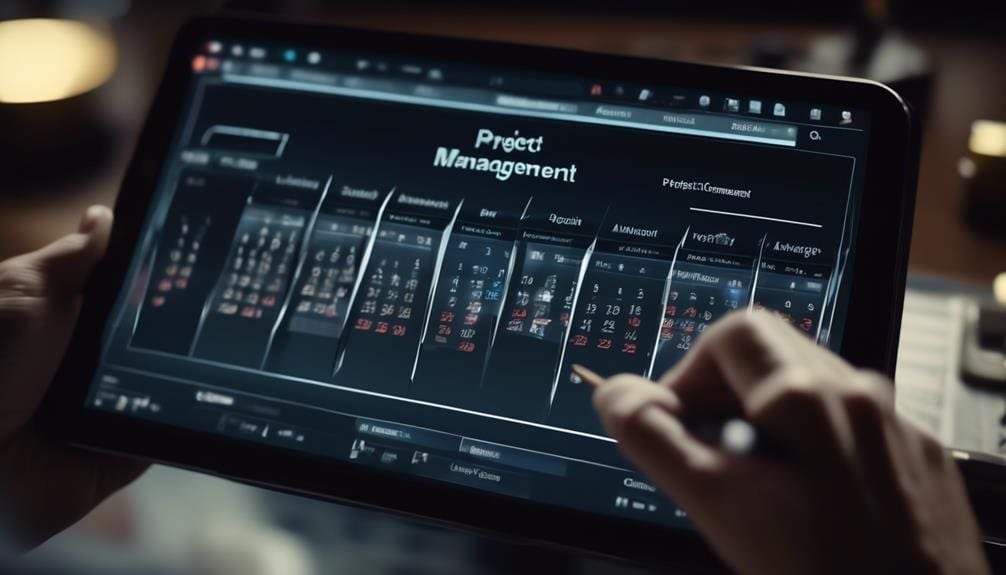Digital Tools and Strategies for Project Efficiency
In today's fast-paced and interconnected business landscape, the effective management of projects is crucial for organizations to stay competitive and deliver results efficiently.
As technology continues to evolve, digital tools and strategies have become indispensable for enhancing project efficiency and streamlining workflows. From project management software to collaboration platforms and task automation tools, the digital arsenal available to project managers is vast and varied.
However, the key lies in identifying the right combination of tools and strategies that align with the specific needs and goals of a project. This exploration of digital solutions is essential for staying ahead in an increasingly digital-centric environment, and the potential benefits are too significant to ignore.
Key Takeaways
- Project management software and collaboration platforms streamline and organize project aspects, including project scheduling, resource allocation, task management, communication, and document sharing.
- Customization options, mobile accessibility, intuitive navigation, and real-time updates are key features of collaboration platforms that improve productivity and facilitate seamless communication and collaboration among team members.
- Integration options in collaboration platforms, such as application integration, API connectivity, and custom integrations, optimize workflows, automate repetitive tasks, and improve data management.
- Time tracking applications offer benefits such as improved productivity, better resource allocation, accurate billing, and provide a basis for analyzing team and individual performance, identifying bottlenecks, and optimizing workflows. Choosing the right app is crucial considering factors like user interface, integration capabilities, reporting features, and compatibility with existing systems.
Project Management Software
Project management software plays a crucial role in streamlining and organizing the various aspects of a project, enabling teams to collaborate effectively and efficiently. One of the key features of project management software is project scheduling. This functionality allows project managers to create and manage project schedules, allocate resources, and set deadlines, ensuring that the project progresses in a timely manner. By providing a centralized platform for scheduling, team members can access up-to-date information, understand their individual responsibilities, and track the overall progress of the project.
Moreover, project management software also has a significant impact on team productivity. The software often includes tools for task management, communication, and document sharing, which are essential for facilitating seamless collaboration among team members. With these capabilities, team members can easily communicate, share updates, and access necessary project documents, ultimately fostering a more productive work environment. Additionally, the software can generate reports and analytics, providing insights into team performance and project progress, which can further enhance productivity by identifying areas for improvement.
Ultimately, project management software is instrumental in optimizing project scheduling and maximizing team productivity.
Collaboration Platforms
Collaboration platforms play a critical role in project efficiency by offering key features such as real-time editing, file sharing, and task management.
The user interface of these platforms can significantly impact user experience and adoption rates, making it essential to consider ease of use and accessibility.
Additionally, the ability to integrate with other digital tools and software is crucial for seamless workflow and data management across different aspects of a project.
Key Features
Efficient project management relies heavily on the seamless integration of collaborative tools, enabling teams to work cohesively towards shared goals.
Two key features that greatly enhance the effectiveness of collaboration platforms are customization options and mobile accessibility.
Customization options allow teams to tailor the platform to their specific project needs, such as adapting workflows, organizing tasks, and creating personalized dashboards. This flexibility can significantly improve productivity and streamline communication.
Moreover, mobile accessibility ensures that team members can access the collaboration platform from anywhere, at any time, enabling real-time updates and seamless communication, even when on the go.
These features are essential for modern project management, as they facilitate adaptability and responsiveness, ultimately leading to improved efficiency and successful project outcomes.
User Interface
The seamless integration of collaborative tools, including customization options and mobile accessibility, greatly impacts the user interface of modern collaboration platforms, enhancing the overall project management experience. Interactive design and user experience are crucial elements of modern collaboration platforms, ensuring that users can easily navigate, communicate, and access project information. The user interface plays a significant role in enabling effective project collaboration by providing intuitive layouts, customizable dashboards, and real-time updates. Below is a table illustrating key features of user interface design in modern collaboration platforms:
| User Interface Features | Description |
|---|---|
| Customization Options | Allows users to personalize their interface based on their specific needs |
| Mobile Accessibility | Enables users to access the platform from anywhere, at any time |
| Intuitive Navigation | Provides easy and seamless navigation throughout the platform |
| Real-time Updates | Ensures that users have access to the most current project information |
| Interactive Communication | Facilitates seamless communication and collaboration among project team members |
Integration Options
With the increasing demand for seamless project management, modern collaboration platforms offer diverse integration options tailored to meet the specific needs of organizations. These integration options are vital for data integration, ensuring that information flows smoothly between different tools and systems. Moreover, they enable process optimization by streamlining workflows and automating repetitive tasks, thereby enhancing overall project efficiency.
The following are key integration options available:
- Application Integration: Seamless integration with various applications, such as CRM and ERP systems, to ensure consistent data flow.
- API Connectivity: Providing robust APIs that allow organizations to connect their internal systems with the collaboration platform.
- Custom Integrations: Offering customizable integration options to meet specific organizational requirements.
These options enable organizations to effectively integrate their existing tools and processes, resulting in improved data management and optimized workflows.
Task Automation Tools
Task automation tools play a crucial role in streamlining project workflows and improving productivity by reducing manual tasks and human error. These tools enable process optimization and workflow streamlining, allowing teams to focus on high-value tasks and decision-making rather than repetitive, time-consuming activities. Below is a comparison of some popular task automation tools:
| Tool | Key Features |
|---|---|
| Zapier | Integration with thousands of apps, multi-step workflows |
| Microsoft Flow | Automated workflows across apps and services, customizable triggers |
| IFTTT | Connects apps and devices with conditional statements |
| Automate.io | Integration with popular apps, multi-app workflows |
| Integromat | Visual scenario builder, connects apps and automates complex tasks |
These task automation tools offer a plethora of features designed to simplify and automate routine tasks, ultimately leading to increased efficiency and accuracy in project execution. By leveraging these tools, businesses can reduce human error, save time, and allocate resources more effectively, thus achieving higher project success rates.
Communication Solutions
Efficient communication solutions are pivotal for fostering collaboration and ensuring seamless information exchange within project teams. In today's digital era, project teams have access to a myriad of communication tools and strategies that can significantly enhance their efficiency and productivity.
Some key communication solutions include:
- Team Messaging
- Utilizing team messaging platforms such as Slack, Microsoft Teams, or Mattermost can facilitate real-time communication, file sharing, and integration with other project management tools.
- Features like channels, direct messaging, and notifications help team members stay connected and informed, leading to quicker decision-making and issue resolution.
- Virtual Meetings
- Leveraging virtual meeting tools like Zoom, Microsoft Teams, or Google Meet enables geographically dispersed teams to conduct face-to-face discussions, brainstorming sessions, and progress updates.
- Video conferencing capabilities enhance communication by allowing participants to observe non-verbal cues, leading to better understanding and engagement.
- Collaboration Tools
- Platforms like Trello, Asana, or Jira provide communication features alongside task management, enabling teams to discuss tasks, share updates, and coordinate activities within the project management environment.
These communication solutions empower project teams to overcome communication barriers, streamline information flow, and ultimately drive project success.
Time Tracking Applications
Time tracking applications play a crucial role in project management. They offer benefits such as improved productivity, better resource allocation, and accurate billing.
Choosing the right app can be a determining factor in the success of time tracking efforts. Considerations such as user interface, integration capabilities, and reporting features are essential.
Benefits of Time Tracking
Enhancing productivity and project management can be achieved through the implementation of effective time tracking applications, which offer valuable insights into resource allocation and task prioritization.
The benefits of time tracking applications include:
- Improved Productivity: Time tracking helps in identifying time-consuming tasks, allowing for better time management and improved productivity.
- Accurate Billing: It enables accurate billing for clients or internal cost allocation by tracking the time spent on specific projects or tasks.
- Performance Analysis: Time tracking data provides a basis for analyzing team and individual performance, identifying bottlenecks, and optimizing workflows.
These benefits collectively contribute to streamlined project management, efficient resource allocation, and improved overall performance.
Choosing the Right App
Selecting the appropriate time tracking application is a critical decision that significantly impacts project efficiency and resource management. When choosing a time tracking app, it's essential to consider various selection criteria such as ease of use, compatibility with existing systems, reporting capabilities, and cost-effectiveness.
The app should integrate seamlessly with project management tools to provide accurate time data for better decision-making. However, implementing a new time tracking app can also pose challenges, including user adoption, data migration, and potential disruptions to existing workflows. It's crucial to address these implementation challenges proactively by providing adequate training, clear communication, and support to ensure a smooth transition.
Resource Allocation Strategies
Implementing effective resource allocation strategies is crucial for optimizing project efficiency and ensuring the successful completion of tasks within specified timelines. To achieve this, project managers can employ the following strategies:
- Resource Optimization
- Utilize digital tools for resource management to identify and assign the right resources to specific tasks based on their skills, availability, and workload.
- Leverage data analytics to gain insights into resource utilization patterns, allowing for proactive adjustments to prevent overallocation or underutilization of resources.
- Capacity Planning
- Conduct regular assessments of the team's capacity to handle workloads and adjust resource allocation as needed to prevent burnout and maintain productivity.
- Use historical project data and forecasting techniques to estimate future resource requirements accurately, enabling proactive planning for resource needs.
- Collaborative Decision-Making
- Encourage open communication and collaboration among team members to ensure that resource allocation aligns with project goals and individual strengths, fostering a balanced and efficient distribution of tasks.
Data Analytics for Performance Tracking
Utilizing advanced data analytics techniques allows project managers to gain valuable insights into team performance and project progress, enabling informed decision-making and proactive adjustments to optimize overall efficiency.
Performance analysis through data interpretation and trend analysis provides project managers with the ability to track key performance indicators, identify potential bottlenecks, and assess the effectiveness of implemented strategies.
Data visualization tools further aid in presenting complex project performance data in a clear and concise manner, facilitating better understanding and communication of insights across the project team.
Conclusion
In conclusion, the utilization of digital tools and strategies can significantly enhance project efficiency.
By employing project management software, collaboration platforms, task automation tools, communication solutions, time tracking applications, resource allocation strategies, and data analytics for performance tracking, teams can streamline their processes and maximize productivity.
These tools and strategies provide a potent pathway to propel project progress and performance.







